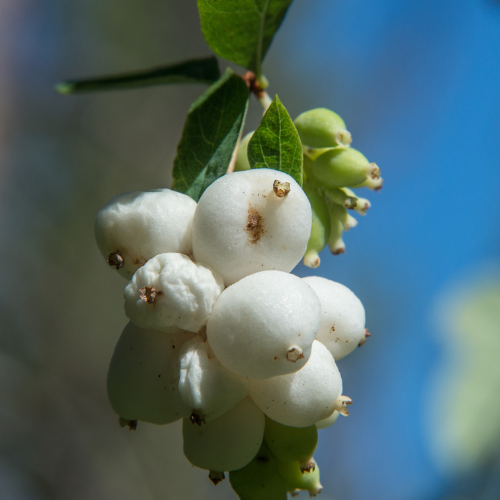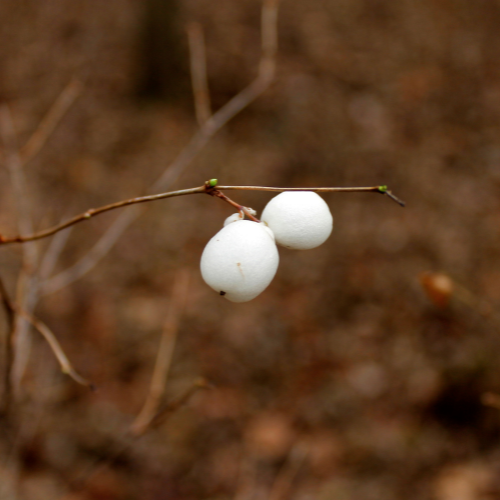Snowberries have a couple of names such as Waxberries, Ghostberries, and even their International Code of Botanical Nomenclature name “Symphoricarpos albus”.
Snowberries are wild fruits that look like creamy white puffs similar to snowballs. To the untrained eye, these little fruits look quite enticing to eat but be warned snowberries are certainly poisonous to both dogs and humans, including a variety of other household pets.
Snowberries can cause vomiting, diarrhea, dizziness, and drowsiness if consumed by dogs.

Strangely enough, birds seem to be able to consume snowberries with little to no problems at all and prove very beneficial for birds, butterflies, and other wildlife.
The reason snowberries are toxic is that they contain toxic compounds called Saponins. Saponins are a key player when it comes to plants defending themselves. Saponins make plants bitter-tasting in an attempt to dissuade the attack from eating them. They also have a foamy quality which is agitated when mixed with water.
Can Snowberries Kill My Dog?
Although not a great deal of research has been done on the topic it seems the general consensus is a dog would have to consume a large number of snowberries to feel the full effects of the toxin.
If a dog eats snowberries it’s unlikely to be fatal but will cause negative consequences when overconsumed. The bigger the dog the less impact likely as the toxins have to spread further.
- How to Train Your Dog to Ignore Other Dogs? [Complete Guide]
- Do Dogs Get Sad When You Yell at Them?
- Neem Oil Dog Toothpaste – Is It Safe For Dogs?
- Do Dogs Know When Humans Are Sleeping?
What Should I Do if My Dog Has Consumed Snowberries?
If possible you should try to induce vomiting from your dog. The best way to do this is by using Hydrogen peroxide (3 Percent Solution) It’s something many people keep at home in their first aid boxes. You should read this guide on the best ways to induce vomiting from your dog. It’s ideal that we remove the snowberries from your dog’s body before they start to digest them.
However if for whatever reason this is not possible or you believe it to be too late I would suggest the best course of action is to call a vet. It’s better to be safe than sorry.

If you are based in the United States you can call the Pet Poison Helpline at 855-764-7661 or ASPCA Animal Poison Control at 888-426-4435. Alternatively, if you are based in other countries do a quick search to find a similar helpline in your country.
Be sure to monitor your dog’s behavior and watch for any symptoms that may occur. If your dog starts to display signs of sickness then a quick trip to the vet is advised.
Fun Fact About Snowberries
It is said that many Indigenous people used snowberries for making various medical creams which were crushed and rubbed on the skin to treat burns, warts, rashes, and sores
On the other side of the spectrum, they were also used for killing large amounts of fish. Indigenous people would put large amounts of the berries into the lake in turn poisoning all the fishing, giving them a quick easy meal.
Conclusion
Snowberries are indeed poisonous to dogs and you should take precautions to ensure that your dog doesn’t consume them. If in the event that your dog has consumed snowberries it’s most likely not a cause for concern however, it is still recommended that you get a check-up or ring your local vet for further advice. Monitor your dog’s symptoms carefully and if things start to worsen don’t hesitate to take your dog to the emergency vet.

Doctor of Veterinary Medicine (D.V.M.) at Nation Taiwan University,Master of Science (M.S.) in Biomedical Engineering at National Taiwan University of Science and Technology




